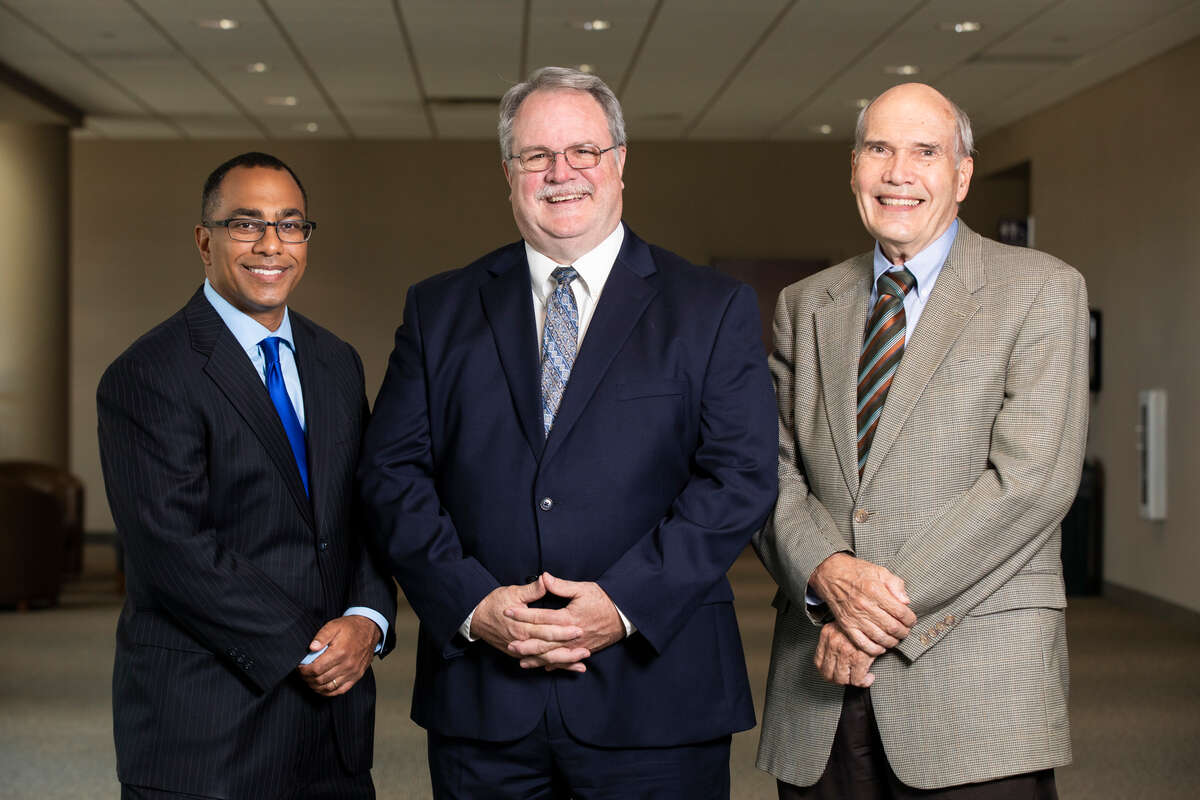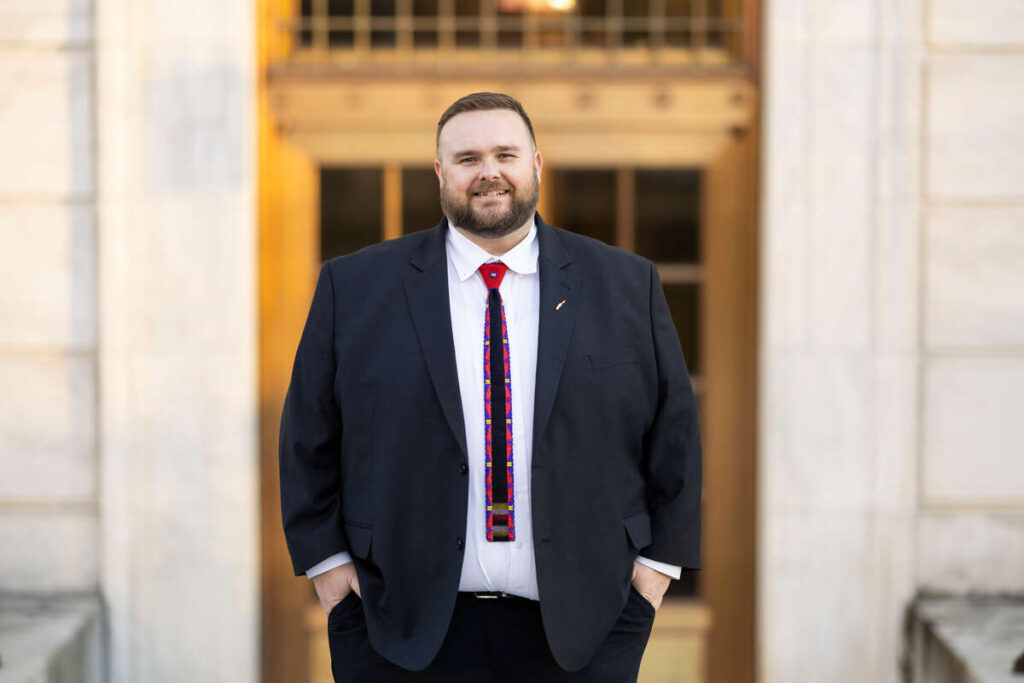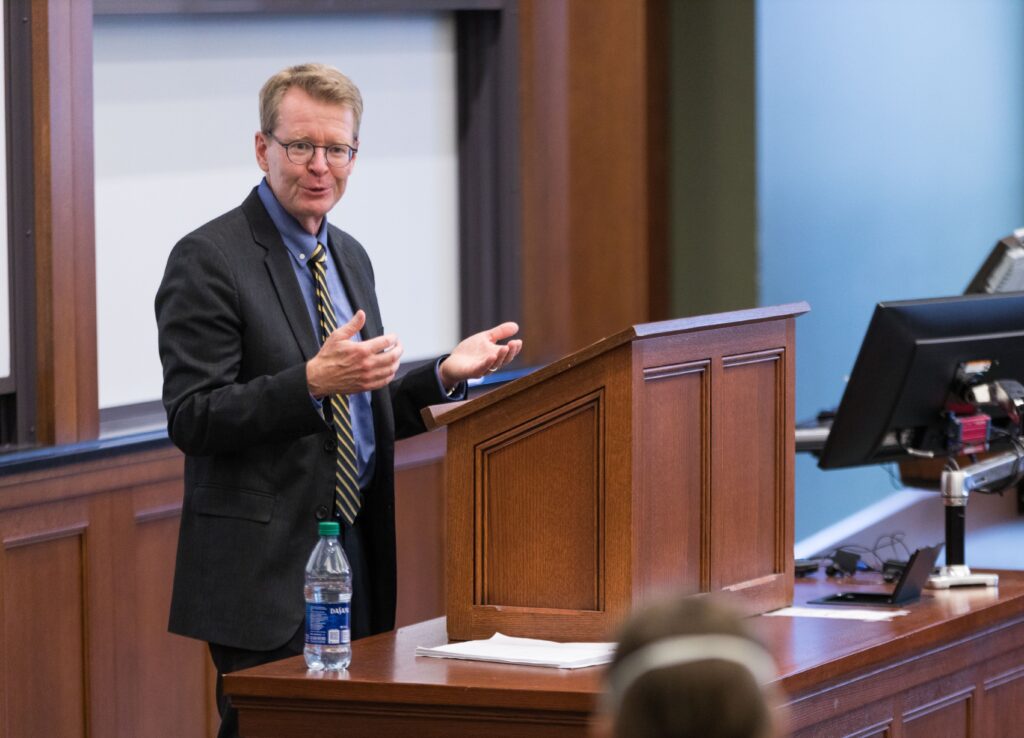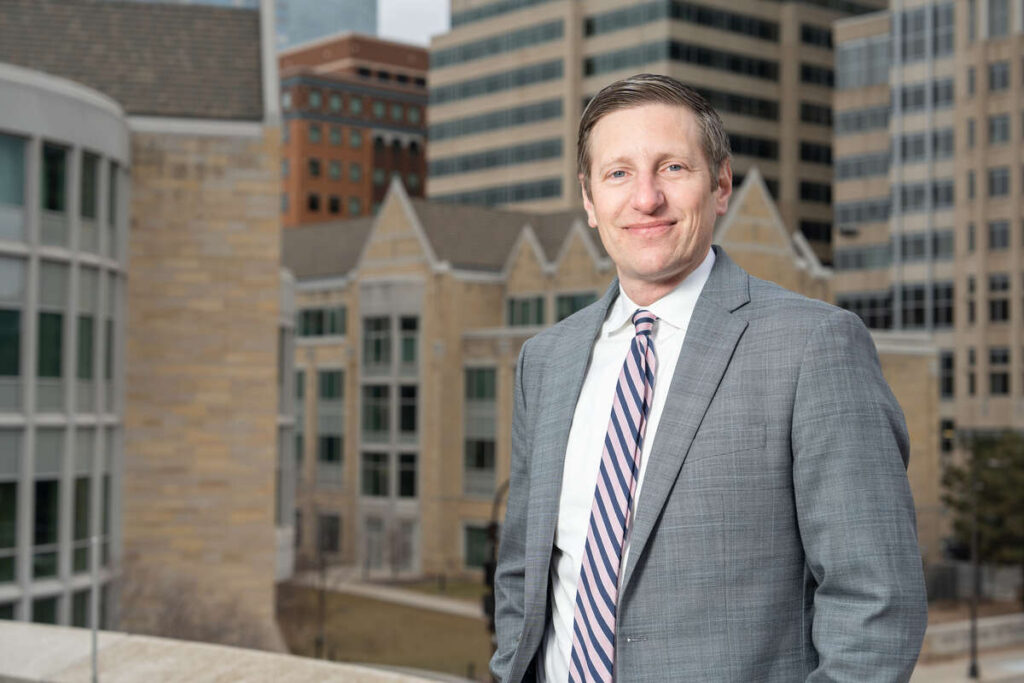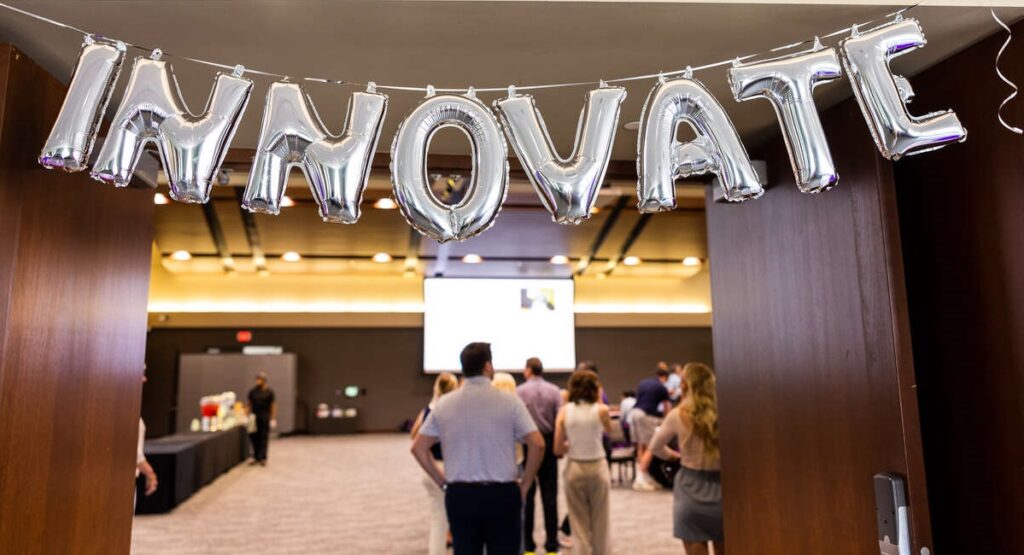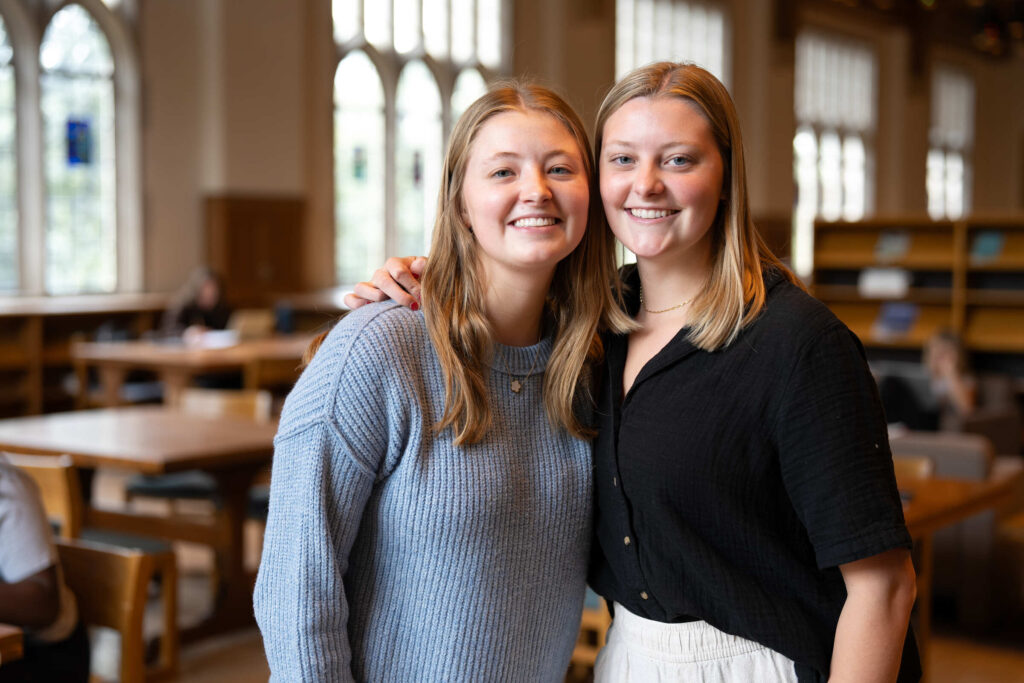The Holloran Center for Ethical Leadership in the Professions at the School of Law is making an impact on law schools nationwide. As a leader in professional identity formation, the center’s influence was confirmed in February 2022 when the American Bar Association revised accreditation Standard 303 to require law schools to provide substantial opportunities for students to develop a professional identity.
Professional formation is deeply embedded in the University of St. Thomas School of Law’s mission, vision and values.
“Since its founding, the Holloran Center has been deeply connected to the mission of the law school as we seek to educate our students in a holistic way that enables them to turn inward and draw upon their deepest values while simultaneously learning how to turn outward in service to others,” St. Thomas Law interim Dean Joel Nichols said. “The idea of professional formation is central to all we do, as it connects to our desire to be deeply welcoming to students ‘as they are,’ while also partnering with them on a path toward their vocation with the knowledge and skills of a professional.”
Holloran Center co-directors Neil Hamilton and Jerry Organ’s scholarly work and collaboration with law schools nationwide has built the framework for the professional identity formation movement.
Since 2007, Hamilton has published 60 long articles and three books on professionalism and student professional identity formation. Organ has published several articles as well and has been one of the principal investigators in an ongoing study of law student wellness.
Cross-institutional collaboration
The Holloran Center has organized six University of St. Thomas Law Journal symposia on student professional formation starting in 2008 and is now organizing a seventh for the spring of 2023.
In early 2013, Hamilton and Organ decided that an effective way to get other legal educators interested in professional formation and build awareness about it nationally was to host a workshop where teams of faculty and staff from law schools could come to learn about the topic and develop individual and institutional plans to foster it among their students.
Following success in summer 2013, the Holloran Center hosted two workshops every summer through 2019 – ultimately welcoming more than 250 faculty and staff from more than 40 law schools, with several sending multiple teams.
The workshops initially focused on faculty
“A couple of schools wanted to bring administrative staff and career services teams, and we welcomed them,” Organ said. “That opened our eyes to the fact that everyone in the building contributes to professional formation – it doesn’t just happen in the classroom with professors. It happens in the milieu of the law school, and is shaped by interactions with librarians, academic support personnel, adjunct professors and all sorts of other people. We have come to understand how much this is a whole-building approach.”
Todd Peterson, Carville Dickinson Benson research professor of law at The George Washington University Law School, has brought several team members to numerous Holloran Center workshops. He is the director of the GW Law Inns of Court and Foundations of Practice programs, and brainstormed ideas with his team to implement professional formation at the school.
One idea, which Peterson’s team thought of at the first Holloran Center workshop they attended, resulted in a revamped legal research and writing program. They took the program from one taught by adjunct professors to a program taught by full-time faculty with increased credit hours. The additional credit is devoted primarily to professional identity formation based on what Peterson and his team learned from Hamilton and Organ.
“I honestly feel that I owe each of them so much both from an institutional perspective on behalf of GW Law and from my own personal perspective,” Peterson said. “The work they have done and the work they have encouraged me to do has enhanced my enjoyment of teaching and greatly enhanced the meaning I draw from the work that I do with the law school in ways that I don’t think I could have developed by myself. Their thoughtful and inspiring guidance has helped me to increase and develop my own enthusiasm and joy in the teaching of law on so many levels.”
Hamilton was one of the Holloran Center’s founding members, along with Thomas Holloran and School of Law Senior Distinguished Fellow Hank Shea. The momentum of the Holloran Center has drawn others to serve as Holloran Center fellows. In addition to Shea, other fellows include School of Law Senior Distinguished Fellow Dennis Monroe and external fellows Louis Bilionis (University of Cincinnati College of Law), Barbara Glesner Fines (University of Missouri-Kansas City School of Law), and Kendall Kerew (Georgia State University College of Law).
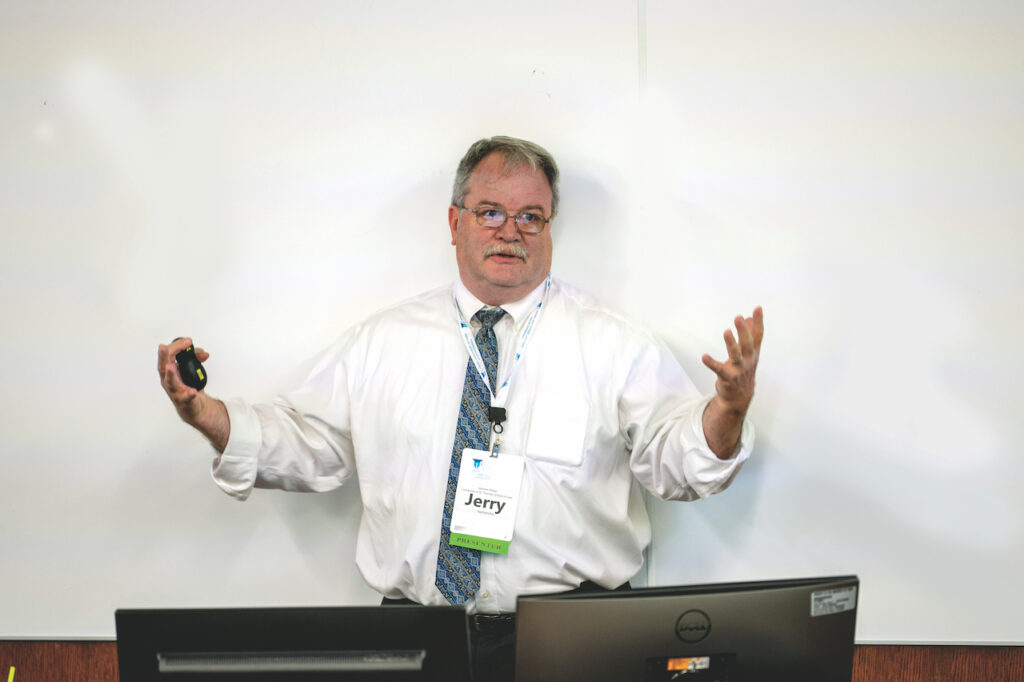
Reflecting on the impact of the Holloran Center, Hamilton said, “I feel deep gratitude. It’s such a blessing to work with these people.”
Chiming in, Organ referred to Scripture.
“We’ve been planting seeds, and not all of those seeds flourish,” he said. “But we’ve been blessed because a lot of them have flourished and a lot of the people we’ve interacted with have found this inspiring.”
A locus for professional identity formation work
Law student professional development and lawyer professional identity formation became a topic of discussion in 1992, when the ABA’s MacCrate Report called for a more practice-oriented approach to legal education by setting out 10 lawyering skills and four professional values.
Practical skills training and professional identity formation efforts gained additional traction in 2007, when the Carnegie Foundation for the Advancement of Teaching published Educating Lawyers: Preparation for the Profession of Law.
“Among other things, that book made the forceful point that law schools excelled at teaching critical thinking skills, perhaps more effectively than any of the other professional disciplines, but failed to a considerable measure in providing law students with meaningful professional identity formation experience or training, and contrasted legal education with medical education, which the authors held up as a model of good professional identity formation practice,” James Leipold, former executive director of the National Association for Law Placement (NALP) said. “The criticism hit home. It’s from this work that the Holloran Center springs.”
“The Holloran Center is unique in that it has provided a place for scholars and teachers and other professionals involved in law student teaching, training and counseling to come together to study the problems and challenges associated with making meaningful change in the legal education curriculum,” Leipold said. “The Holloran Center has been a locus for the most sustained work on law student professional development that has been done ever in the history of U.S. legal education.”
One of Hamilton’s books, Roadmap, helped to elevate the visibility of the Holloran Center. The book, which is used by St. Thomas Law as well as a number of other law schools, helps law students focus on the path to meaningful employment. “A commitment to serving others does not happen by accident – it happens through reflection and moral growth,” said Rob Vischer, former dean of the law school and now president of the University of St. Thomas. “The Holloran Center has led a national movement to take professional formation more seriously. Conversations about formation come easily to a law school that takes faith seriously, and when we combine that with rigorous research and an investment in relationship-building, the Holloran Center’s conversations translate into action and systemwide change.”
The Holloran Center was a major aspect of what attracted St. Thomas Law Professor David Grenardo to the school. He joined the center in 2022 as its associate director.
“The Holloran Center is considered the leader in professional identity formation. The center has literally changed legal education,” Grenardo said. “Jerry and Neil have done such an incredible job.”
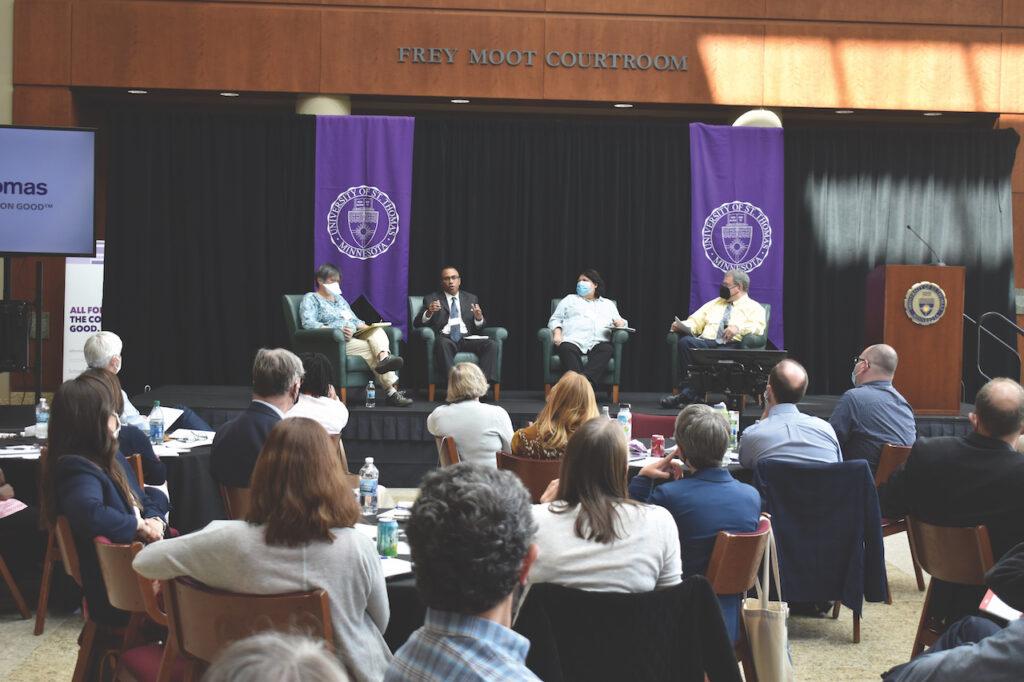
Grenardo helped to launch the center’s blog in August, which features guest contributors from across the nation. The team is also considering launching a podcast.
“A theme to all of this [success] is gratitude and blessing,” Organ said. “We have been blessed that our interest in professional identity formation was something that a lot of other people shared an interest in and wanted to support. The winds were blowing the right direction at the right time, and we found people to walk with us on this journey to help give the movement momentum. We plan to take advantage of the wind behind our sails.”
This story is featured in the spring 2023 issue of St. Thomas Lawyer.
